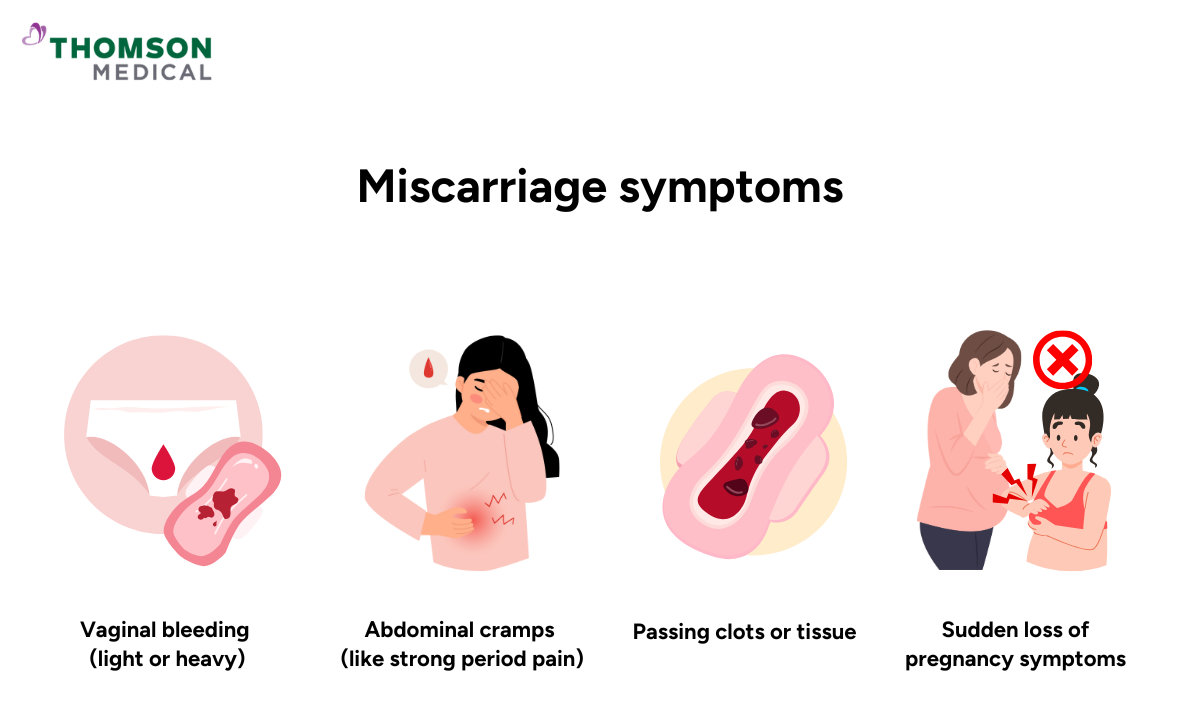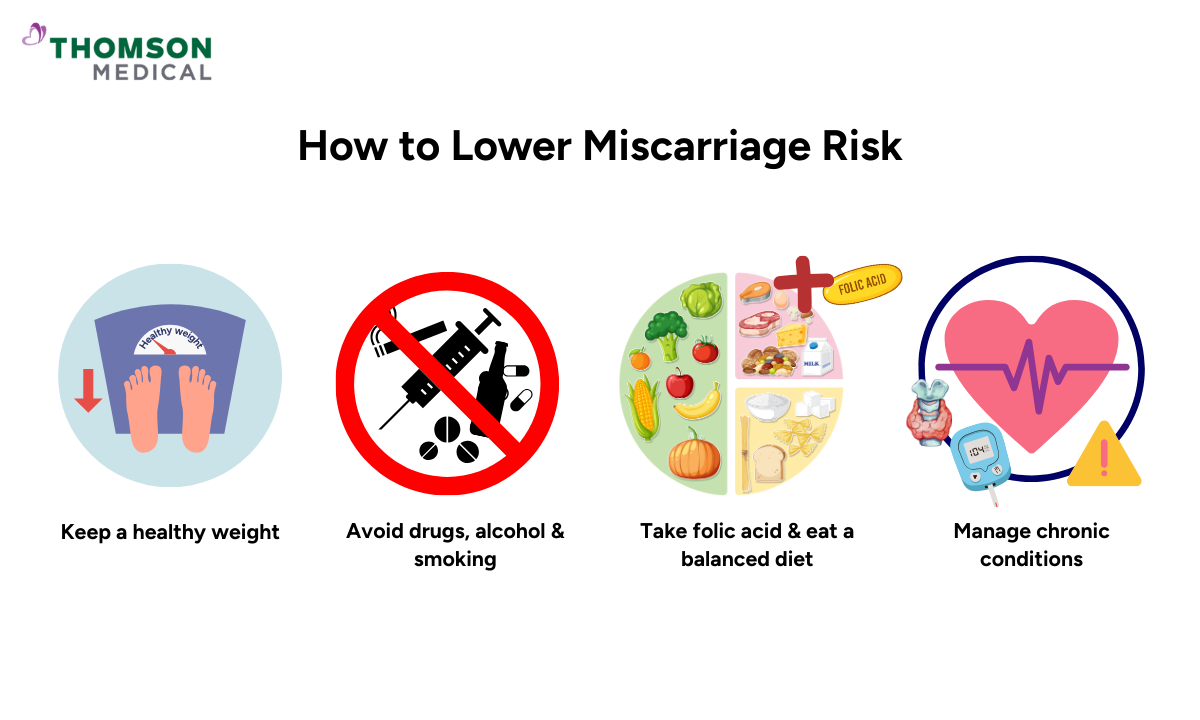A miscarriage happens when a pregnancy ends on its own before the baby can survive outside the womb. It’s more common than many people realise, but that doesn’t make it any less painful. You may feel sadness, shock, or even guilt—but please remember, it is rarely anyone’s fault.
This guide is here to gently explain what a miscarriage is, the signs to be aware of, why it can happen, and the kinds of support and options available to help you through this difficult time.
What is a miscarriage?
A miscarriage happens when a pregnancy ends on its own before the baby is able to survive outside the womb, typically before the 24th week. This happens when the embryo or foetus stops developing, and the body naturally ends the pregnancy. Miscarriage is, unfortunately, one of the most common experiences during early pregnancy.
How common is miscarriage?
Miscarriage is unfortunately frequent. About 10–20% of recognised pregnancies end in miscarriage, though many occur before a woman even knows she is pregnant. Most happen in the first trimester, and the risk drops significantly in the second trimester.
Types of miscarriage
Not all miscarriages are the same, and doctors describe them based on what happens in the body. The common types are:
Missed miscarriage
This happens when the embryo or foetus stops growing, but the body hasn’t passed the pregnancy yet. Often, you might not notice anything at all, and it’s discovered during a routine scan.
Recurrent miscarriage
If someone loses two or more pregnancies in a row, it’s called recurrent miscarriage. Causes might include genetic issues, hormone problems, or uterine issues. Doctors usually do tests to figure out why it’s happening, which can help plan for future pregnancies.
Threatened miscarriage
A threatened miscarriage is when there’s some bleeding and mild cramps, but the cervix stays closed. The pregnancy might still continue. If you notice spotting, it doesn’t automatically mean you’ve lost the pregnancy, but it’s a signal to watch things closely.
Complete miscarriage
A complete miscarriage is when all pregnancy tissue passes naturally. Bleeding and cramps usually stop afterward. An ultrasound can confirm that everything is gone.
Inevitable miscarriage
Sometimes there is no way to prevent a miscarriage. This typically occurs when the cervix begins to open and there is bleeding and cramping. The pregnancy will end on its own at this time. Medical or surgical intervention is often needed.
Incomplete miscarriage
After a miscarriage, tissue may occasionally still be present in the uterus. Your gynaecologist may advise using medication or surgery to remove the remaining tissue if this continues to cause bleeding or cramping.
Miscarriage symptoms

Although miscarriage symptoms might vary, you may notice:
Vaginal bleeding, which may be lighter or heavier
Abdominal cramps that resemble strong period pain
Clots or passing tissue
Sudden reduction in pregnancy symptoms, such as breast tenderness or nausea
Some types of miscarriage, like a missed miscarriage, might not show obvious symptoms. That’s why scans and check-ups are so important.
How painful is miscarriage?
Pain varies a lot. Some people describe it like a heavy period. Others have stronger cramps, especially if tissue isn’t fully passed. The emotional pain is also huge, as you might feel sad, shocked, or even guilty. It’s completely normal to feel this way. Talking to someone you trust can help more than you expect.
Causes of miscarriage
Most miscarriages happen because of problems with the chromosomes in the embryo or foetus. These tiny changes stop the pregnancy from developing properly. Other factors can include:
Health conditions like diabetes, thyroid issues, or hormonal problems
Uterus problems, such as fibroids or structural differences
Infections or immune system issues
Rare blood clotting disorders
The important thing to remember: most miscarriages are not caused by anything you did. Your body is usually just responding to something it can’t control.
Risk factors of miscarriage
Having one or more of these factors does not guarantee a miscarriage, but they can raise the risk. These consist of:
Older than 35 years old
Previously experienced a miscarriage
Using drugs, smoking, or consuming alcohol
Being overweight or having uncontrolled chronic diseases
Radiation, certain chemicals, or virus exposure
How is a miscarriage diagnosed?
Your doctor might take a few steps if you’re having cramping, bleeding, or other miscarriage symptoms. The steps include:
Performing an ultrasound to examine the growth and heartbeat
Using a hCG blood test
Examining your pelvis to determine whether your cervix is open
These tests provide precise results and aid in the safe planning of subsequent actions.
Potential complications
Most miscarriages end without serious complications or issues. But in some cases:
If tissue remains in the uterus, it can lead to an infection or heavy bleeding
Without treatment, the infection can become severe
Severe bleeding may require medical attention
It’s important to remember that emotional effects are equally significant.
What are the treatments for a miscarriage?
The type of miscarriage, the stage of the pregnancy, and your comfort level all influence how it is handled. Among the options are:
Expectant (natural) management:
Sometimes, your body passes the tissue on its own over a few days or weeks. Usually, doctors use scans to ensure everything is clear.
Nonsurgical treatment (medication):
Medicines like misoprostol can help the uterus contract and pass tissue faster. It helps to heal faster without needing surgery.
Surgical treatment:
Sometimes, the remaining tissues need to be removed through Dilation and Curettage (D&C) procedure.
The decision is based on your preferences and circumstances. What is safest and most comfortable for you will be explained by your doctor.
Our fertility specialists
Loading...
How to lower the chance of miscarriage

Not every miscarriage is avoidable, but the risk can be lowered. You can take steps such as:
Eating a balanced diet and maintaining a healthy weight.
Avoiding unhealthy habits such as drugs, alcohol and smoking.
Take fertility supplements like folic acid.
Control long-term illnesses like diabetes or thyroid issues.
Emotional support and coping after miscarriage
Miscarriages can cause distress. Many people experience sadness, remorse, or grief. Coping mechanisms include:
Talking to a partner, friend, or family member
Joining a support group or talking to a counsellor
Remembering it’s rarely anyone’s fault
Knowing that many people go on to have healthy pregnancies
Miscarriage can feel very isolating, but you do not have to face it alone. Support from loved ones and professionals can help you heal. If you would like guidance on what to do next, you may request an appointment with our specialist for both medical and emotional support.
FAQ
What are the first signs of having a miscarriage?
Bleeding, cramps, or passing tissue. Some notice a drop in pregnancy signs such as nausea or breast tenderness.
What should I do?
Call your doctor. If bleeding is heavy, you feel dizzy, or have a fever, seek urgent help. Rest, drink fluids, and lean on support.
How is miscarriage confirmed?
Ultrasound, blood tests for hCG, and pelvic exams can help confirm whether a miscarriage has happened.
How painful is miscarriage?
Pain ranges from mild cramps to stronger contractions. Passing tissue may feel uncomfortable.
Can stress cause miscarriage?
Normal stress doesn’t cause it. Most losses happen due to chromosome problems. Long-term stress may affect health indirectly, but it isn’t a direct cause.
Which sleeping position can cause a miscarriage?
In early pregnancy, your sleeping position does not increase the risk of miscarriage. After 20 weeks, sleeping on your left side is recommended, as it helps improve blood flow. Sleeping on your back at this stage may be less ideal, but it does not cause miscarriage.
The information provided is intended for general guidance only and should not be considered medical advice. For personalised recommendations and tailored advice based on your unique situations, please consult a specialist at Thomson Medical. Request an appointment with Thomson Medical today.
For more information, contact us:
Thomson Specialists (Women's Health)
Thomson Women's Clinic (TWC)
- Novena:
6592 6686 (Call), 8611 8986 (WA) - Bukit Batok:
6569 0668 (Call), 8686 3525 (WA) - Choa Chu Kang:
6893 1227 (Call), 8282 1796 (WA) Jurong:
6262 8588 (Call), 6262 8588 (WA)- Katong (female doctor):
6970 2272 (Call), 8611 9020 (WA) - Punggol:
6243 6843 (Call), 8811 0328 (WA) - Sembawang: 6753 5228
- Sengkang: 6388 8125
- Serangoon (female doctor): 6382 3313
- Tampines: 6857 6266
- Tiong Bahru: 6276 1525
